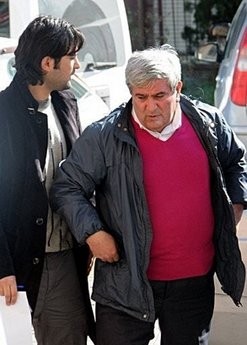A Turkis

h court ordered seven suspects to be remanded in custody Wednesday over an alleged coup plot against the Islamist-rooted government in 2003, a controversial probe that has fanned tensions in the already polarised country.
The suspects included two active-duty admirals, two retired admirals, a retired one-star general and two retired colonels, Anatolia news agency reported.
They were among around 50 military figures -- including the former chiefs of the navy and air force, Ozden Ornek and Ibrahim Firtina -- who were rounded up Monday in the toghest action so far targeting the influential Turkish army.
Six other suspects were released after questioning, Anatolia said.
Ornek and Firtina were expected to be questioned by prosecutors later Wednesday before a court decides whether to release them or jail them pending trial.
The arrests prompted an emergency meeting Tuesday of the army's four-star generals and admirals to discuss the "serious situation," a brief army statement said.
Back from a visit to Spain, Prime Minister Recep Tayyip Erdogan held a meeting with senior aides late Tuesday.
The probe has deepened rifts between secularist forces and the government that have plagued Turkey since the AKP -- the offshoot of a now-banned Islamist movement -- came to power in November 2002.
AKP supporters say the army, which has unseated four governments and has traditionally wielded heavy political influence, must be forced to toe the line and stop meddling in politics.
But opponents charge the AKP is using the guise of democratisation to discredit the army, seen as the bulwark of the secular system, and get a free hand in realising its Islamist ambitions.
The purported coup plot, codenamed "Operation Sledgehammer", was allegedly drawn up in 2003 at the Istanbul-based First Army, shortly after the AKP came to power.
It is unknown whether the suspects took any concrete action to implement the plan, first reported in January by the Taraf newspaper, which routinely targets the military.
The plot allegedly involved plans to bomb mosques and escalate tensions with Greece in a bid to force the downing of a Turkish jet, thus discrediting the government and ultimately leading to its downfall.
Taraf said the plan was discussed at a seminar at the First Army in March 2003 and published the transcripts of audio tapes that appeared to confirm that some kind of anti-government action was considered.
The army said the seminar involved the discussion of war-time contingency plans and denied a coup plot.
Cetin Dogan, the retired general accused of leading the plot, has confirmed the threat of Islamist movements was discussed, but said documents were doctored to include plans to bomb mosques and for the downing of a Turkish plane.
Dogan is also among those rounded up Monday.
Turkey's chief of staff Ilker Basbug has decried a "psychological campaign" to smear the military, while vowing commitment to democracy and asserting that coup proponents will not be tolerated.
Retired and active-duty soldiers are already among dozens of defendants in a long-running probe into a purported network which allegedly planned assassinations and violence to spark political chaos and prompt a military coup to oust the AKP.
The probe's credibility waned as police began arresting journalists, writers and academics known AKP critics, with prosecutors relying heavily on anonymous letters and secret witnesses. Some suspects have accused police of fabricating evidence.
Critics say the investigation has become an instrument to bully and disable the secularist opposition.
Turkey's chief prosecutor said last week he was examining whether the government exerts pressure on the judiciary, a move that may in theory result in a bid to seek AKP's closure at the constitutional court.
In 2008, the AKP narrowly escaped being banned for violating Turkey's secular system.






)

















